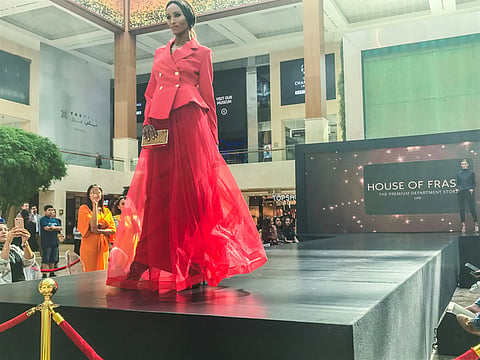Dubai sets the stage for modest fashion
Here’s Dubai’s role in the fashion revolution

Dubai: A fashion movement that’s taking the world by storm began right here, in the UAE.
Modest fashion – which usually comprises loose, comfortable clothing that is less revealing than its conventional alternative – is now a $44 billion industry (Dh161 billion), according to the “State of the Global Islamic Economy Report” produced by Reuters in collaboration with DinarStandard. The same report calculates modest wear to be worth $327 billion (Dh1,201 billion) by the year 2020.
Mohammad Saeed Al Shehhi, chief executive officer of Dubai Design District (D3), told Gulf News: “I think it’s a niche product that the whole fashion industry needed, and when it was available, people just loved it. It’s growing and gaining momentum.”
After Istanbul Modest Fashion Week in 2016, London hosted its first-ever Modest Fashion Week in 2017, featuring more than 40 labels. Dubai held its first one last year, as well.
After Istanbul Modest Fashion Week in 2016, London hosted its first-ever Modest Fashion Week in 2017, featuring more than 40 labels. Dubai held its first one last year, as well.
With a growing interest from Muslims and non-Muslims alike, mass market retailers are taking note, too.
For instance, two days before International Women’s Day 2017, Nike unveiled its ‘Pro Hijab’ and took the leap into modest sportswear. In the same year, Adidas teamed up with a Middle Eastern designer for the first time, to come up with a capsule collection. Saudi designer Arwa Al Banawi’s collection included French terry knitted sweatpants, black oversized hoodies and long sleeves with the statement: “You say you get me but you don’t.”
Dolce and Gabbana and Chanel were early adopters of modest fashion, and many other international brands are following suit.
Even the modelling industry is embracing the trend. Pakistani-Moroccan Mariah Idrissi became the first hijab-wearing model to feature in an H&M campaign, while Somali-American model Halima Aden made headlines during New York Fashion Week, when she donned modest wear for Kanye West’s Yeezy Season 5 show.
Change has arrived, on the runway and in people’s wardrobes. And it’s about time, say designers.
Faiza Bouguessa, designer and founder of Dubai-based modestwear brand Bouguessa, said: “When I started doing Paris Fashion Week... I would meet a lot of international buyers. And when I would introduce my brand, I would explain my concept of making modestwear. The moment I would say ‘modestwear’, they would just turn their backs and walk away. I’m exaggerating, but it’s really how I felt... But now, I feel that I’m getting contacted because I’m doing modestwear.”
Today, the global appeal of modest fashion has helped removed cultural barriers and expanded its reach. Even American singer Beyoncé was spotted wearing a velvet Bouguessa robe during a fundraiser in Los Angeles, last year.
It’s a fashion evolution that is logical, according to Dima Ayad, designer and public relations/marketing director at The Modist, a first-of-its-kind e-retailer dedicated to contemporary modest fashion. The brand was launched in Dubai in 2017 and has a secondary office in London.
Ayad said: “I think 50 per cent of what women wear in general, is actually modest dressing. When you’re in the workplace, you’re modestly dressed, and in certain other arenas too… It’s religious, it’s personal, it’s about your certain size and shape and what you prefer, what looks better on you and what doesn’t. All of that is part and parcel of defining a woman and her choices.”
Dubai was quick to understand the potential of the design and fashion industry – modest fashion in particular – and to establish a hub for designers who could create, collaborate, and sell on international platforms.
Al Shehhi said: “His Highness Shaikh Mohammad Bin Rashid Al Maktoum [Vice President and Prime Minister of the UAE and Ruler of Dubai], ordered us to create Dubai Design District, to become the creative hub for designers. The project was launched in 2013… Today we have more than 500 designers — more than 220 of them are fashion designers.”
Many of them have gained global recognition. For instance, Amato was founded by designer Furne One and textile expert Rashid Ali, and is the UAE’s first global couture fashion brand. The Modist took modestwear to the world digitally, and provides express delivery to over 100 countries.
Furniture designers based in D3 are also emerging on a global stage. Emirati product designer Aljoud Lootah saw two of her designs acquired by the National Gallery of Victoria in Melbourne, Australia.
Al Shehhi summed up D3’s role in the fashion revolution: “The idea of D3 is to become the home for these creative people and to potentially have a few of them go international… then they will inspire the rest of the world from Dubai. That’s the potential of D3.”
Sign up for the Daily Briefing
Get the latest news and updates straight to your inbox



